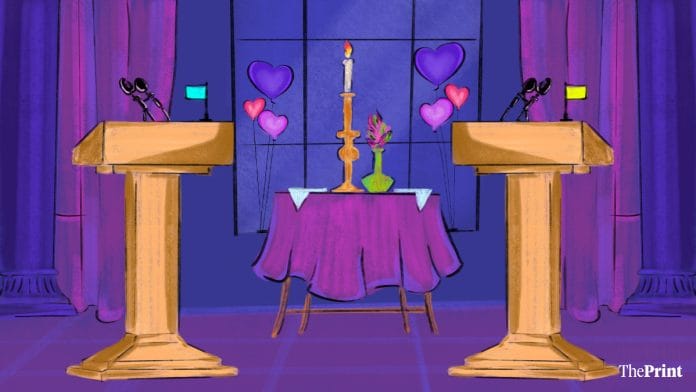For better or worse, a ‘Proud Hindu’ will not fall in love with an Ambedkarite. They won’t even show up on each other’s dating app algorithms. That’s how deeply personal the political is now. So, to game the system, unique identities are born—he calls himself a Marxist on his Hinge profile and argues against reservation in his tweets.
Gen Z, looking for politically aligned lovers, is having a nightmare filtering profiles on Hinge and Bumble. Talk about the woes of woke dating. The apps let daters label themselves as either Liberal, Conservative, Moderate, Apolitical, and—just to be safe—Other (for the Unabomber types). Mixed with what’s-your-religion categories, the dating pool seems to have a serious crisis of identity. How can an atheist be a conservative? To quote a journalist in Chennai— “Bumble, Hinge are just like Tamil Nadu. Only the ones living in the state can understand its political language.”
As someone addicted to installing and uninstalling dating apps, I may have picked up on some basics. A policy bro who calls himself a Liberal will mostly play the devil’s advocate when it comes to caste, communal violence, or consent. He apparently ‘read’ both sides but decided to side with the one that gets him the most matches in the class he’s dating—which may or may not be the one he was born into. Vera Papisova, a journalist who dated Far-Right men in New York to write an article for Cosmopolitan magazine, revealed that most of them “speak Liberal”.
Also read: There’s an art and science to texting on dating apps. Hone your skills or get ghosted
Love is political
A 26-year-old scholar in Sonipat hooked up with a similar kind. He quotes James Baldwin, encourages his friends to read women authors, and is both a dog and a cat person—he’s a dream. But to qualify as his girlfriend, there’s a strict dress code to follow. Apparently, he doesn’t like “his woman” seeking attention by wearing what she actually wants. He calls himself a liberal feminist, and policing the hemline is just his choice.
Then, there are the spinelessly sinister who don’t pick sides. The Apoliticals. The only time they care about human rights is when it directly affects their weekend plans. In these polarised times, how can anybody be apolitical? It’s obvious that neutrality is their favourite cop-out. A friend from college only swipes right on this lot to break them. Everyone is political about something. One guy just said traffic.
The Left-leaning singles are dead serious about never dating someone from the other side. “Swipe left if you lean Right,” says one Bumble bio. “Don’t swipe right if you’re a Sanghi” is also a popular prompt these days. Meanwhile, the Right has its own screening system—bios that declare “Jai Shri Ram” followed by three red-flag emojis are simply trying to weed out beef eaters and secularists. To be fair, love has always been political—from the time of Heer-Ranjha, Romeo-Juliet, to Meghan-Harry. The Internet-raised adults are just less in denial about it.
That said, we’re not perfect in drawing these ideological lines. So what if we can’t be caught dead on a date with someone from the enemy camp in public? Sometimes we’re fine with keeping the opposition in sleeper cell rotation. There’s really no point in judging and fixing a climate-change denier or a tree-hugger if you just want to see them post 11 pm. Go ahead, take the risk.
These arrangements are often quite entertaining. Take the casteist Bihari girl in Gurugram who decided to throw a bone (one night stand) at a West Delhi Jatt boy, “even though I can’t stand you people”. But there’s only so much casual bigotry one can swallow for sex—so he gave it right back: “I toh love you people, my maid is Bihari.”
Those defeated in the dating game by their own political incorrectness blame the woke culture for killing romance. What else would a sore loser say? If we vacuum the romance of politics, then what are we really agreeing on? The smell of roses? The colour of sunset? The mountain peaks? There’s climate politics in this too. You can’t escape it in the 21st century.
Views are personal.
(Edited by Zoya Bhatti)






